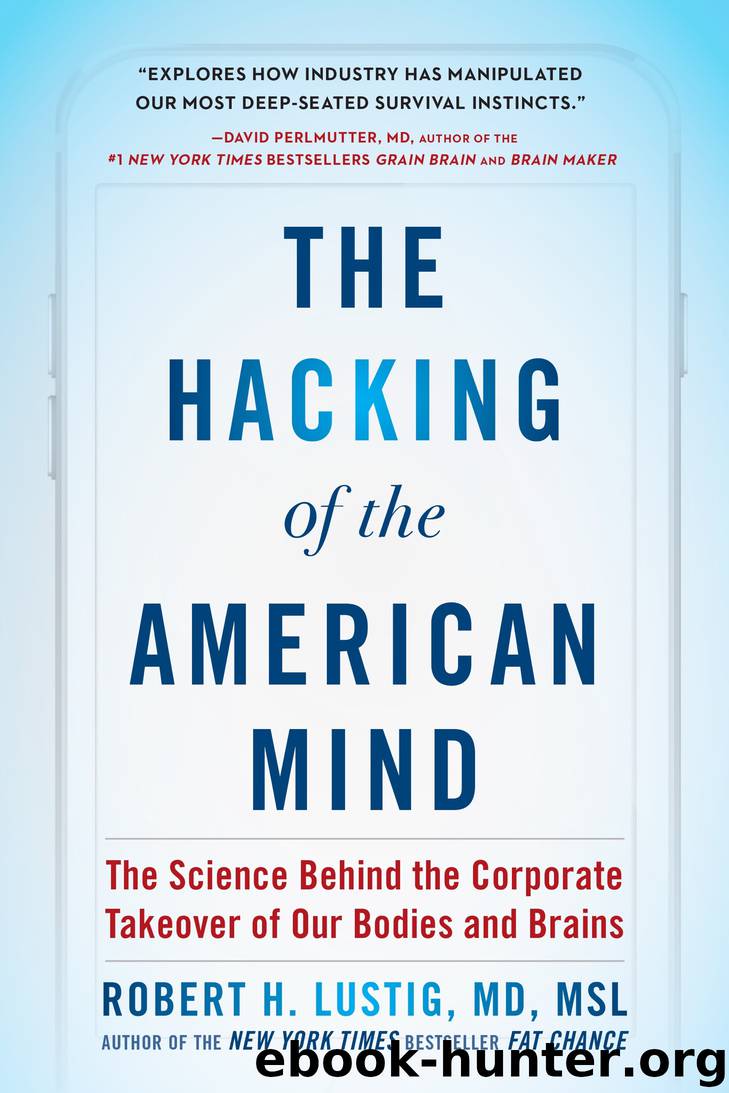The Hacking of the American Mind by Robert H. Lustig

Author:Robert H. Lustig
Language: eng
Format: epub, mobi
Publisher: Penguin Publishing Group
Published: 2017-09-12T04:00:00+00:00
Mobile Madness
Does cell phone use drive cortisol, the other bad boy in this paradigm? Cell phone use is linked with stress, sleep loss, and depression in young adults (although of course causation cannot be proven). A recent study in young adults showed that cell phone use was negatively linked to grade point average—the higher the cell phone use, the poorer the grades.7 They also found, perhaps unsurprisingly, that higher GPAs tended to correlate with more happiness, while more anxiety was linked to less happiness. Anxiety and happiness were assessed with two well-known questionnaires for assessing mental health: the Beck Anxiety Inventory and the Satisfaction with Life (SWL) index. Statistical analysis on these associations encouraged the researchers to suggest cell phone use is linked—via GPA and anxiety—to loss of happiness. Another study demonstrated that fourth and seventh graders who sleep with cell phones in their room get less sleep than those who don’t,8 although we can’t say whether they’re playing games on them or if the problem is just the glow of the screen. We do know that sleep deprivation increases food intake and risk of weight gain (see Chapter 9), driving further unhappiness. In a tragic example of distraction by technology, a South Korean couple obsessed with raising their two “virtual children” online let their actual three-month old daughter starve to death.9 It’s not only affecting teenagers. Rehabs are popping up treating “device addiction.” There have been reported cases of withdrawal. While opioids get the most press, internet and gaming addiction is leading to social devolution in large numbers.
From World of Warcraft to Call of Duty to Pokémon Go, video games have been linked to bingeing, and even a few cases of excessive sleep deprivation resulting in death. The Chinese have noted white matter changes in teens and young adults who binge on the internet, and have labeled this phenomenon Internet Addiction Disorder.10 But is this really addiction (see Chapter 5)? Internet and gaming disorders are not yet sanctioned as valid psychiatric diagnoses but are now being considered. In these behavioral addictions, both the nucleus accumbens (NA) and the prefrontal cortex (PFC) are severely dysfunctional.11 Does this lead to depression? One study tracked teens in alternative high schools for one year post-graduation. Those who exhibited anhedonia (difficulty experiencing pleasure) at baseline were more likely to indulge in internet game bingeing and to manifest signs of depression one year later.12 So which came first, the video gaming or the anhedonia? Were these the same kids who’d be listening to Depeche Mode and wearing Goth clothes thirty years ago? Are students who graduate from alternative schools already self-selected for behavior problems?
Download
The Hacking of the American Mind by Robert H. Lustig.mobi
This site does not store any files on its server. We only index and link to content provided by other sites. Please contact the content providers to delete copyright contents if any and email us, we'll remove relevant links or contents immediately.
Nutrition for Sport, Exercise, and Health by Spano Marie & Kruskall Laura & Thomas D. Travis(3346)
Nutrition for Sport, Exercise, and Health by Marie Spano & Laura Kruskall & D. Travis Thomas(3330)
The Sprouting Book by Ann Wigmore(3152)
Flavor Flours by Alice Medrich(2422)
Memory Rescue by Daniel G. Amen(2048)
Superfood Smoothie Bowls: Delicious, Satisfying, Protein-Packed Blends that Boost Energy and Burn Fat by Chace Daniella(1994)
The Bad Food Bible by Aaron Carroll(1962)
Dirty Genes by Ben Lynch(1948)
Genius Foods by Max Lugavere(1776)
The Main Street Vegan Academy Cookbook by Victoria Moran(1762)
The Poisoner's Handbook by Deborah Blum(1755)
Good Calories, Bad Calories by Gary Taubes(1735)
The I Quit Sugar Cookbook by Sarah Wilson(1699)
Core Performance Essentials by Mark Verstegen(1682)
Memory Rescue: Supercharge Your Brain, Reverse Memory Loss, and Remember What Matters Most by Amen Dr. Daniel G(1647)
Big Girls Do It Stronger by Jasinda Wilder(1630)
Android App Development by Franceschi Hervé J.;(1551)
Sugar Crush by Dr. Richard Jacoby(1527)
Dr. Colbert's Keto Zone Diet by Don Colbert(1386)
